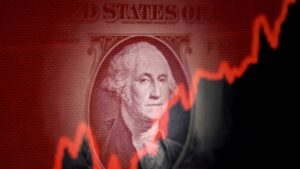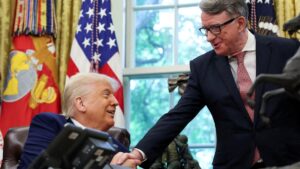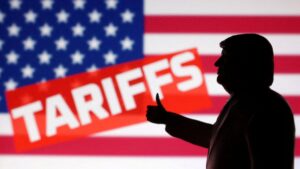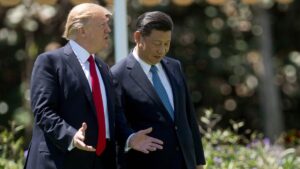Britain’s economy contracted more than expected in April – the first month of the Labour government’s business tax hike and U.S. President Donald Trump’s reciprocal tariffs onslaught, which also led to a record drop in exports to the U.S., official data showed Thursday.
Gross domestic product (GDP) declined 0.3% in the month, compared to 0.2% growth in March, the Office for National Statistics (ONS) said in a statement. That falls below the 0.1% contraction expected by economists.
Exports of British goods to the U.S. fell by a record 2 billion pounds ($2.7 billion) in the same month, the ONS revealed, following the introduction of Trump’s tariffs.
The data comes one day after Prime Minister Keir Starmer’s Labour government laid out its priorities for the coming years, hoping that changes to day-to-day spending amounts and longer-term investment will spur Britain’s sluggish economy.
‘Clearly disappointing’
Finance chief Rachel Reeves injected the ailing National Health Service (NHS) with billions of pounds and pumped funds into defense and housing, while making cuts to other departments.
Reeves said Thursday’s figures were “clearly disappointing” but insisted that her spending plans would deliver growth for Britain.
Paul Dales, chief U.K. economist at research group Capital Economics, noted that the economy faced “subdued overseas demand and domestic businesses cutting back on spending to compensate for the rise in costs driven by April’s increase in taxes.”
Following Labour’s return to power last July, following years of Conservative rule, Reeves announced a tax rise for U.K. businesses, which entered force in April.
Official data this week showed that the hike had contributed to a small rise in Britain’s unemployment rate and a slowdown in growth in average wages.
Record drop
Britain’s economy had expanded by 0.7% in the first three months of the year.
“With the economy now weakening, we can expect to see concerns around further tax rises increase as we near the Autumn Budget – which is likely to weigh on growth even more,” said Lindsay James, investment strategist at Quilter.
The latest data also follows the introduction of a baseline 10% tariff imposed on the U.K. and other countries by Trump at the start of April.
The U.K. and U.S. have since struck a trade agreement that cuts tariffs on British cars and scraps them on steel and aluminum.
Britain, in return, has agreed to open up its markets to U.S. beef and other American farm goods.
But the U.K. remains subject to a 10% tariff on most goods exported to the U.S.
Decreases in exports to the U.S. in April were seen “across most types of goods, following the recent introduction of tariffs,” said ONS director of economic statistics, Liz McKeown.
Machinery and transport equipment, including cars, took a notable hit after four months of consecutive increases in British goods exports to the U.S.
Official data earlier this year showed trade in goods between the U.K. and the U.S. remained balanced in 2024.
Britain imported 57.1 billion pounds ($77 billion) worth of American goods last year and exported products worth a total of 59.3 billion pounds.




















































Be First to Comment